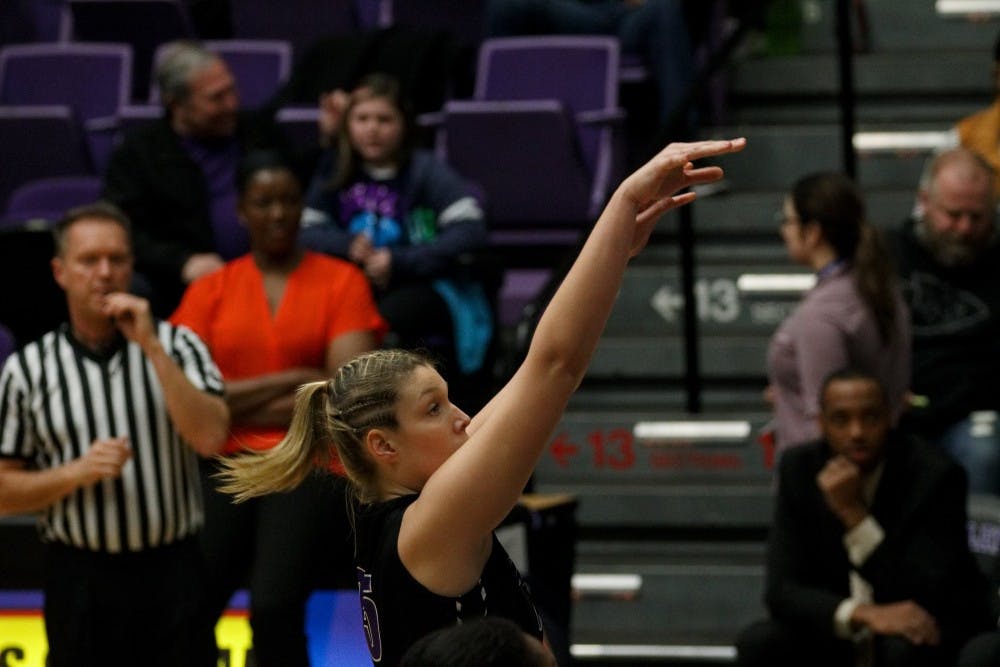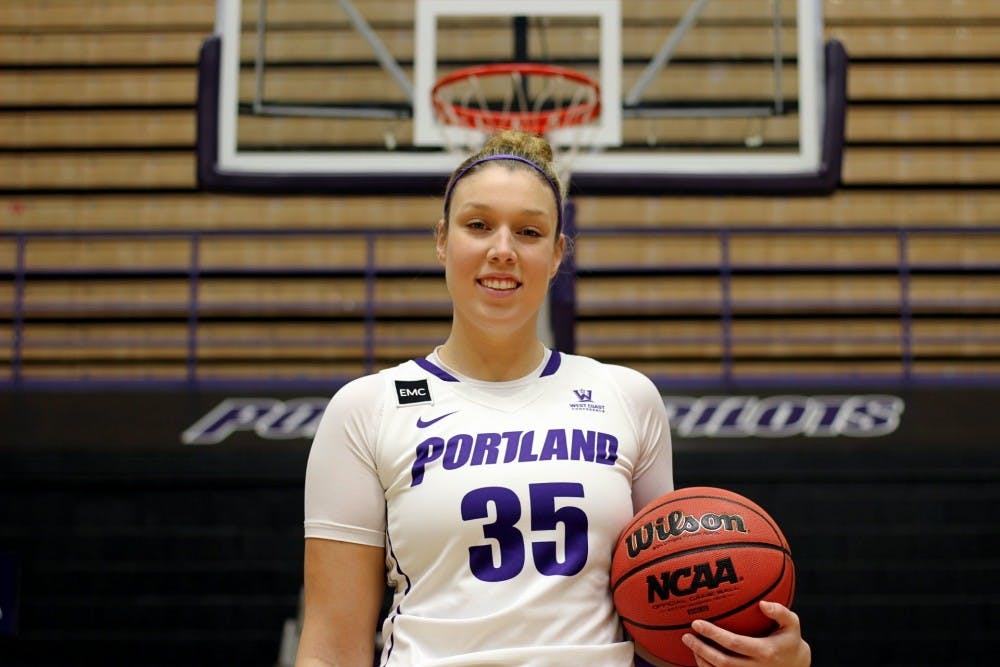For just about everyone, coming to college freshman year is a new and daunting experience. Anyone at the University of Portland can probably relate to feeling out of their comfort zone at least once settling in on The Bluff. Now imagine coming into college not knowing the language or the culture.
Numerous international athletes and students at UP can relate. In Europe, university athletics aren’t placed at the elite level that college sports in the United States are. This means that athletes who are interested in playing pro sports often have to choose between their academic goals and their athletic dreams. It is because of this that many come to the US to play college soccer or basketball, rather than quitting school to continue their athletic careers in Europe.
Luke Hendel and Lucas Van Eynde are two soccer players that now represent UP on the pitch, despite being from Germany and Belgium, respectively. For both of these international students, the main reason for coming to Portland was to continue their academic careers while still being able to play soccer at a high level.
“School and sports are separate and there is no chance to combine both at a high level,” said Hendel on his reasoning for leaving his native country of Germany. His reasoning for coming to UP though was a bit more soccer-based. “The soccer program was the biggest thing for me. Merlo was the nicest field I had seen.”
“I saw that all the guys were really chill and that’s why I chose to come here…mostly for the people,” Van Eynde said about choosing UP.
Whereas it was relatively easy for these exceptional soccer players to fit in on the pitch, getting used to life in America was a completely different issue for these two freshmen. The hardest part for Lucas Van Eynde has been getting used to the new culture.
“Back home everything is more relaxed, less rules and boundaries. While in the US everything should go according to plan for some reason,” Van Eynde said about the difference in cultures between Holland and the US.
“Soccer-wise and academic-wise, everything is so strict.”

For Luke Hendel, the difficulties of his transition were products of living in dorms and keeping up a rigorous schedule. “The biggest transition was living in a dorm, especially in a forced triple, which was horrible. Then the daily routine to practice in the morning, having class after than going to study hall is tough to get used to.”
Nevertheless, there are many things both players are grateful their transition has enabled them to see and do. Van Eynde and Hendel both love American culture, but most of all they share an enjoyment of Oregon itself.
“The people are extremely nice here. I haven’t met someone who’s treated me like a foreigner,” Van Eynde said about Oregon. “(Hendel) living in Berlin, me living in Amsterdam, there’s no nature, it’s just city.”
For Hendel, who is an avid lover of fashion, the absence of a sales tax in Portland is also a big plus. “In Portland there’s no tax, so lots of good shopping and nice stores.”
Both Hendel and Van Eynde said that the culture shock of living in the United States has since worn off, though there are a few trends they still don’t understand.
“I think I’ve settled in pretty well,” Van Eynde said, to which Hendel quickly rebuffed, “I had a culture shock when I saw all the Americans walking around in winter in Birkenstocks. In Germany, you get killed if you’re walking around in winter with Birkenstocks. That seemed unreal to me.”
For both Hendel and Van Eynde, adapting to life on the soccer pitch was a cakewalk compared to the social and academic aspects of their transition. Luke Hendel came from playing several years at Hertha Berlin academy, a well-known team in the German Bundesliga. Van Eynde had spent his years prior to college soccer playing for a strong academy in Amsterdam. Both had offers from major schools, including UCLA for Van Eynde, and both have had little trouble transferring their game from one continent to another.
That being said, both of these skilled players have said that the level of soccer here in the United States was much higher than what they were expecting and far more competitive than they could have imagined. Yet even then, they still find it hard to compare the level of play here versus the level of play in Europe.
“The level in Germany is way higher and I think, it’s not about the players or individual skills. It’s more about tactics and strategy,” Hendel said. “We focus so much on pressing and here the players are good, but they don’t know where to run for balls.”
Sara Zaragoza’s experience was very similar to that of Van Eynde and Hendel with one exception. Unlike her fellow European athletes, Zaragoza spoke almost no English upon arriving at UP. The senior basketball player came from Madrid, Spain found major challenges with the differences between America and her homeland, both on and off the court.
“When I first came here I didn’t understand most of the people I talked to. I couldn’t take notes or understand my teachers,” said Zaragoza. Luckily for her, UP has a large number of international athletes who were able to help. “A teammate of mine, from freshman year, was from Italy and helped me a lot with communicating on the basketball team. There was also a Spanish player on the men’s basketball team who I became friends with.”

Language wasn’t the only barrier inhibiting Sara from getting exactly what she wanted out of the University, as there were major differences on the court as well. The biology major was not used to the number of coaches basketball teams have in America and had to become accustomed to a more physical style of play that she wasn’t used to.
However, Zaragoza’s indomitable spirit and persistent work ethic allowed her to overcome these obstacles. The physical play made her stronger, the extra coaches made her smarter on the court, and her English now flows with the coherence of a native speaker.
It wasn’t easy for Zaragoza and even without the difficulties she had to overcome, she still laments the challenge of dealing with fried food on a consistent basis and the constant rain of the Pacific Northwest. Of course, some changes were good for Zaragoza, like the ability to wear pajamas to class and the hospitality of UP’s population.
For some international athletes here at UP, changing countries is nothing new. This is the case for star freshman on the men’s basketball team, Tahirou Diabate, who has lived in France, Spain, Japan and the United States, not to mention his native country of Mali.
“I was in France because of my parents. I stayed there for seven years, then went back to Mali. I decided I wanted to go to Spain to study and after that I went to Japan” said Diabate, who can speak five languages.
Diabate chose Portland because of its education program and because of UP’s recruiting staff. “Because the guys who recruited me were very nice and kind. My visit was great. It was lit,” said Diabate. The native of Bamako, Mali entered into the sports world as a soccer player, but after his father noticed his growing height, he was put on his current path of playing basketball at the age of eleven.

“I had a hard time adjusting and studying in English,” Diabate said. “I’ve learned how to easily make friends and also, in this school there are people who are dedicated to helping students. They’ve made it much easier for me.”
Not only is Diabate happy with the amount of help the University of Portland has given him with his academics, he’s also extremely honored to be coached on the court by a basketball legend.
“As the coaches always say, we are family, they also help me in improving my basketball skills and my study skills,” Diabate said.“He’s (Porter) everybody’s dream. There are so many guys who want to play D1 basketball and for me to be here playing under Terry Porter, I am honored. I am honored to play here, and I am blessed.”








